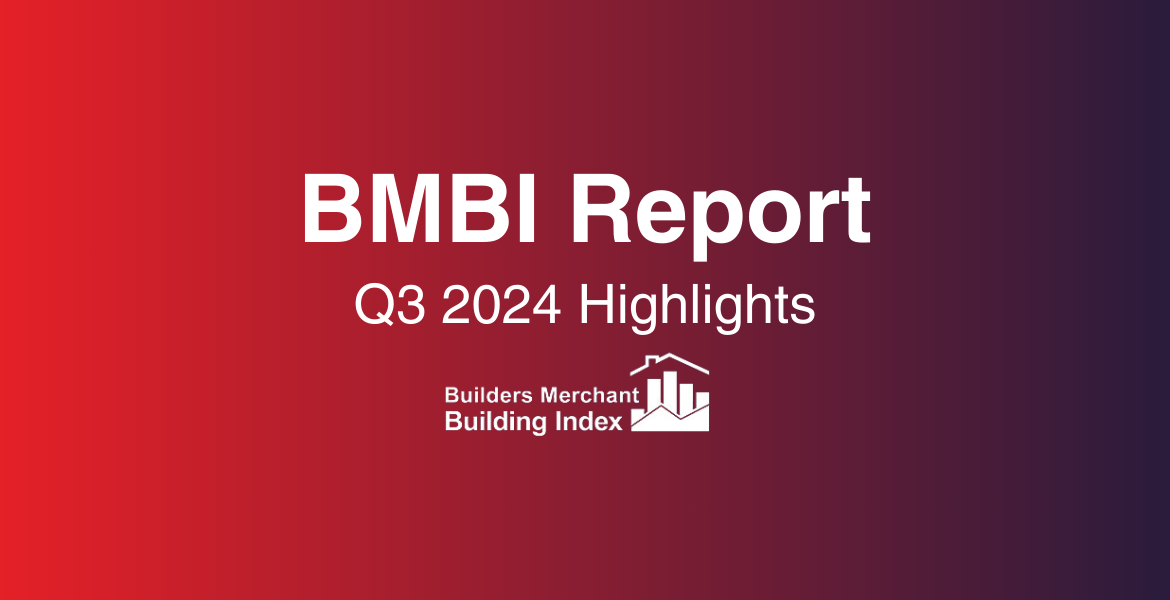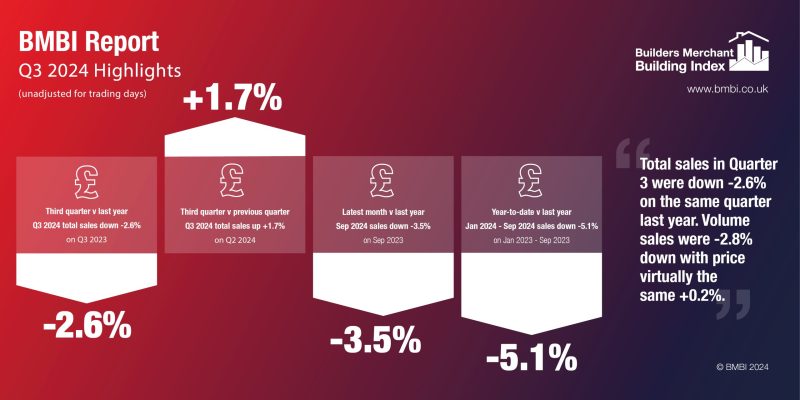
The latest Builders Merchant Building Index (BMBI) report reveals builders’ merchants’ value sales for Q3 2024 were down -2.6% compared to Q3 2023, with volume sales down -2.8% and prices virtually the same (+0.2%). With one additional trading day this year, like-for-like sales (which take the number of trading days into account) were -4.1% lower.
Five of the twelve categories sold more in Q3 2024, led by Workwear & Safetywear (+16.5%). The two largest categories – Timber & Joinery Products (-4.8%) and Heavy Building Materials (-3.5%) – were both down more than total merchants. Renewables & Water Saving (-29.1%) was the weakest category.
Builders’ merchants’ value sales for Q3 2024 were up +1.7% on Q2 2024. Volumes increased +2.3%, while prices were down -0.6%. Ten categories sold more quarter-on-quarter with Workwear & Safetywear (+6.6%) growing most followed by Ironmongery (+3.8%) and Services (+3.6%). Landscaping (-9.3%) and Kitchens & Bathrooms (-0.1%) were the weakest categories. With three more trading days in the most recent period, like-for-like sales were -3.0% lower.
Quarter 3 total value sales weren’t helped by September value sales, down -3.5% year-on-year. Volume sales were also down -3.6% and there was no movement on price. Sales of the two largest categories – Timber & Joinery Products (-5.6%) and Heavy Building Materials (-4.3%) – declined more than Total Merchants.
September sales were also weak compared to August (-1.7%). Month-on-month, volume sales were down -0.7% and prices also decreased -1.0%. Just four categories sold more – they were Workwear & Safetywear (+22.5%), Plumbing Heating & Electrical (+9.6%), Kitchens & Bathrooms (+6.0%) and Tools (+2.3%).
Total value sales for January to September were -5.1% below the same period in 2023. With two more trading days this year, like-for-like sales were down -6.1%.
Mike Rigby, MD of MRA Research who produce this report, said: “There was a small increase in Total Merchant value sales quarter-on-quarter, but sales were down year-on-year. The new Labour Government swept into power on high expectations and a desire for change as voters responded to the promise of growth. But a wet summer and a series of gloomy pronouncements about growth postponed quickly knocked the stuffing out of consumers’ confidence and talked down the markets.
“GfK’s long running Consumer Confidence Index fell to -21 in October, the lowest it has been since March. Perhaps the most telling metric was people’s sentiments about the general economic situation over the last 12 months, which dropped -5 points to -42. A YouGov poll after the budget statement confirmed that 39% of respondents thought the budget would leave them and their family worse off. This isn’t great news for the RMI market as people will be more inclined to save than spend.
“It is good news that the government wants to grow the economy over the course of this parliament. The building industry looks forward to that, and to the necessary improvements in the planning regime, to rebuilding 500 schools, extending HS2 to London Euston, and building 1.5 million homes and some new towns. But you can’t just announce growth and expect it to happen just like that. The industry wound down and mothballed capacity to meet reduced demand. And it isn’t going to invest in new capacity without some certainty of government steadfastness and expectations of demand over a longer time horizon. £100m-£200m factories can take years to take through planning and get built and connected to the grid and water services. More than that, we don’t have the skilled people to build all those homes.”

Set up and run by MRA Research, the BMBI – a brand of the Builders Merchants Federation – is a monthly index of builders’ merchant sales, and the most reliable, up-to-date proxy for Repair, Maintenance, and Improvement (RMI) activity in the UK. The index is based on actual sales from GfK’s Builders’ Merchant Point of Sale Tracking Data, which captures value sales out to builders from generalist builders’ merchants, accounting for 88% of total sales from builders’ merchants throughout Great Britain. An in-depth review, which includes commentary by sector experts, is produced each quarter.